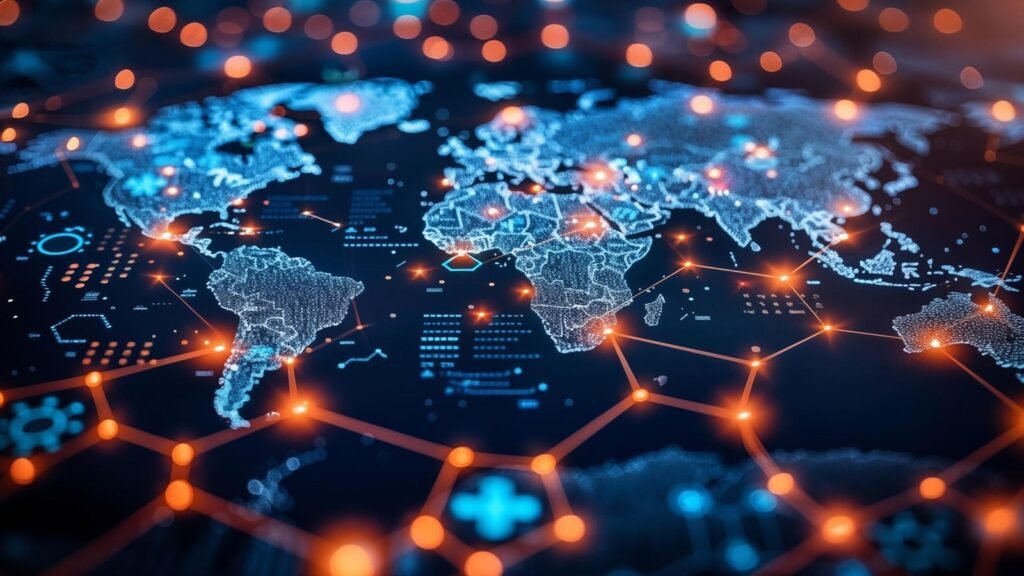Explore the geopolitical impact of artificial intelligence as countries embrace it … [+]
Artificial intelligence (AI) will be one of the most transformative technologies of the century, which means it is fast becoming a key factor in global politics.
Countries preparing (and in many cases already deploying) AI tools for security, intelligence, international relations, and trade are keenly aware of the potential for AI to impact the global balance of power.
In fact, the impact is predicted to be so dramatic that the highly influential think tank RAND reports that “nations around the world could gain or lose power depending on how they harness and manage developments in AI.”
We’ve already seen governments restrict the export of advanced AI technology to rival nations, citing national security concerns, and the growing calls for control of the global semiconductor supply chain are another sign of just how dangerous this new AI arms race is.
So how will AI technologies being developed today affect the future of international cooperation and competition, and how will governments balance the technology’s potential to foster growth and reshape society with the risks it poses to privacy, security, and trust?
AI and National Security
From autonomous warfare to intelligent cyber defense, nations that win in the AI race are gaining an advantage in national security.
Evidence of this can be found in the conflict in Ukraine, where technologies developed by developed Western countries are helping Ukraine thwart aggression by its much larger neighbor.
But AI’s impact on security goes beyond the battlefield: As cyber attacks become more numerous, damaging, and difficult to detect, cyber defense professionals are increasingly turning to AI to provide protection.
In addition, AI is also being used for surveillance to detect and prevent international crime, espionage, and terrorism. Of course, using controversial technologies such as facial recognition for these purposes also raises important civil rights and privacy issues.
This has led to growing concerns in recent years about the extent to which technologies developed, and potentially controlled, by competing governments are being integrated into national infrastructure.
All these examples show how, when it comes to geopolitics, AI advantages are creating competitive advantages for nations, states, and global coalitions.
Those in power will face the challenge of navigating the fine line between harnessing that potential and ensuring that human rights and ethical principles are upheld.
International Trade and Business
In recent years, AI’s role in international trade and economics has proven to be as important globally as its impact on military and security issues.
The potential advantages created by AI are giving rise to new forms of international tensions, often focused on potential sanctions and protectionist measures taken by countries seeking to maintain or increase their own competitive advantage.
A clear example is the export controls on advanced AI chips and semiconductor technology: both Western countries and China have made concerted efforts to avoid using foreign technology.
A little-stated concern is that, in the event of a deterioration in international relations, no country wants to become dependent on technology provided by a hostile competitor. National security is the most commonly cited reason for such restrictions and trade embargoes, but maintaining economic advantage may be considered just as important.
Particular mention should be made of the precarious role played by countries such as Taiwan and South Korea, home to leading semiconductor manufacturers such as TSMC and Samsung, which face the challenge of maintaining trade relations with the West and China while protecting their own economic interests.
While the United States and China are widely considered to be the leaders in the development and ownership of AI technology, Goldman Sachs researchers identified several “battleground states” whose big stakes in the international AI market could influence world politics, including the UK, the UAE, Israel, Japan, the Netherlands, South Korea, Taiwan and India.
Meanwhile, measures introduced through legislation such as the EU AI Law have also been likened to a form of protectionism: These new laws make it possible to restrict access to certain geographic markets if AI service providers refuse to share details about how their data and technology work, or to comply with local laws.
For example, Brazil’s recent ban of X (formerly Twitter) was sparked by concerns about the spread of misinformation on the platform, but it also highlights how nation states are increasingly recognizing the potential of digital networks to shape political debate and sow political instability. We may see more countries start to use their powers to try to regulate this.
Global cooperation or techno-nationalism?
These examples illustrate the complex and destabilizing impact that the AI revolution will have on geopolitical issues.
We are already seeing that it can trigger protectionist measures as countries seek to control its impact on societies while using it for security and economic advantages.
This shows that the need for international cooperation is more urgent than ever. AI holds great potential in solving some of the world’s most pressing challenges, from tackling climate change to improving healthcare. But these efforts could be undermined if nations and states refuse to put aside political or economic conflicts.
Protectionist measures, or even techno-nationalism, threaten to stifle the flow of ideas, collaboration, and innovation that are essential to making the world a better place with AI.
Of course, healthy and fair competition can also generate innovation. So the way forward will involve a blend of competition and cooperation. Initiatives such as the AIxGEO project, led by the Bennett Institute for Public Policy at the University of Cambridge, aim to develop frameworks for this kind of “co-opetition”.
We must expect our leaders to be ready to recognize that the most pressing challenges of the AI era, such as the proliferation of cyber attacks and the spread of disinformation, can only be solved collaboratively across borders.




